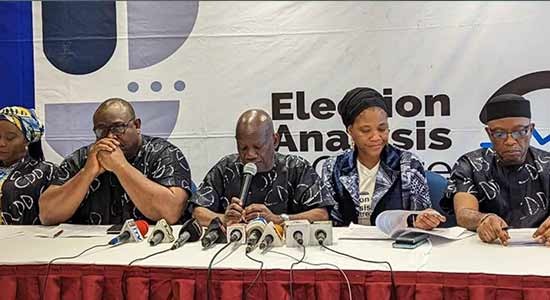Power Of Incumbency, Identity Politics Mar Guber Polls — CDD

The Centre for Democracy and Development (CDD), has identified the power of incumbency and identity politics as factors that affected the conduct of the November 11 governorship election in Bayelsa, Imo and Kogi State.
CDD in its post-election analysis also called for separation of what it regarded as unpredictable technical failures that are due to the operational, logistical and infrastructure challenges of electoral administration, from the politically instigated failures attributable to deliberate manipulation by candidates, political parties and their proxies.
Chair of the organisation Prof. Adele Jinadu, at a press conference on Monday, said unfair partisan party-political electoral advantage by the governing parties in the three states posed a challenge to the conduct of the election.
Prof. Jinadu noted that the power of incumbency was deployed to distort the party primary process of the governing parties in two of the three states, Bayelsa and Imo, where the incumbent governors sought re-election for a final second term; while in Kogi State, the outgoing governor who was not seeking re-election “because he was serving out his final non-renewable second-term, used the full panoply of state power and resources to ensure the victory of his preferred candidate during the ruling party’s primary election.
“The impact of the abuse of the power of incumbency, so illustrated, created an unfair level playing ground that gravely diminished the credibility of the off-cycle elections in the three states.”
He condemned identity issues in the election, which he said, assumed the form of the ethnic configuration in the three states.
According to him, “In Kogi State …while the retiring incumbent governor ensured not only that the ruling party nominated a candidate from his ethnic group in the state, the other major parties chose candidates from other ethnic groups, hoping to cash in on the claim that the next governor must come from their own ethnic groups.
“Another form of identity played out was as geographical or zonal identity. In Bayelsa State, for example, the APC campaigned on the claim that the eastern zone of the state should produce the next governor.
“In Imo State, the PDP based its campaign on the governorship returning to the Owerri zone, on equity grounds, while LP staked a claim for the Okigwe zone.
“This particular form of identity politics as geographical identity or zoning draws on the federal character clauses of Nigeria’s 1999 Constitution.
“Another version of the identity politics is the gender consideration that influenced the choice of female deputy governorship candidates by the APC candidate for governor in Imo State and PDP in Kogi State.”
He expressed fear that identity politics when it is used to mobilise political support has the tendency for it to descend into ethnic profiling, ethnic hate speech and the tendency for the political mobilisation of ethnicity to descend into violent ethno-political conflict.













